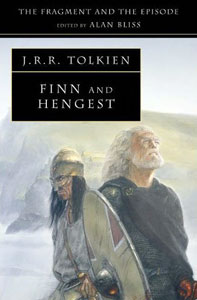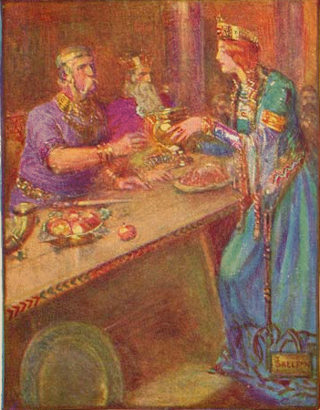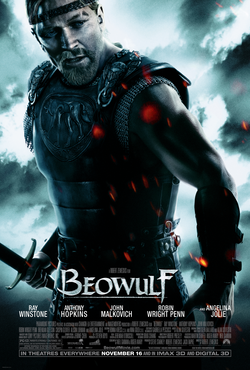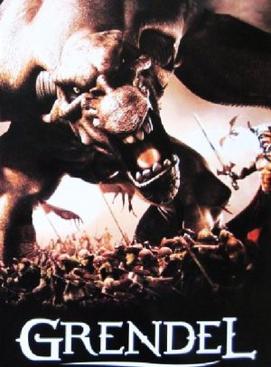Hildeburh, introduced in line 1071 of the poem, Beowulf , is the daughter of the Danish King Hoc and the wife of the Finn, King of the Frisians. Her story is sung by a scop during festivities in lines 1071-1158.
Hildeburh in her marriage to Finn thus acts as a freothuwebbe or peace-weaver (an important concept in the poem). However, the peace was not kept and Hildeburh lost her brother, Hnæf, son and husband in battle. Hildeburh's position as a link between the two kingdoms and her stoicism are central concepts to the story.

Beowulf is an Old English epic poem in the tradition of Germanic heroic legend consisting of 3,182 alliterative lines. It is one of the most important and most often translated works of Old English literature. The date of composition is a matter of contention among scholars; the only certain dating is for the manuscript, which was produced between 975 and 1025. Scholars call the anonymous author the "Beowulf poet". The story is set in pagan Scandinavia in the 6th century. Beowulf, a hero of the Geats, comes to the aid of Hrothgar, the king of the Danes, whose mead hall in Heorot has been under attack by the monster Grendel. After Beowulf slays him, Grendel's mother attacks the hall and is then defeated. Victorious, Beowulf goes home to Geatland and becomes king of the Geats. Fifty years later, Beowulf defeats a dragon, but is mortally wounded in the battle. After his death, his attendants cremate his body and erect a tower on a headland in his memory.

In Norse mythology, Brísingamen is the torc or necklace of the goddess Freyja. The name is an Old Norse compound brísinga-men whose second element is men "(ornamental) neck-ring, torc". The etymology of the first element is uncertain. It has been derived from Old Norse brísingr, a poetic term for "fire" or "amber" mentioned in the anonymous versified word-lists (þulur) appended to many manuscripts of the Prose Edda, making Brísingamen "gleaming torc", "sunny torc", or the like. However, Brísingr can also be an ethnonym, in which case Brísinga men is "torque of the Brísings"; the Old English parallel in Beowulf supports this derivation, though who the Brísings may have been remains unknown.

Finn and Hengest is a study by J. R. R. Tolkien, edited by Alan Bliss and published posthumously in book form in 1982.
Finn, son of Folcwald, was a legendary Frisian king. He is mentioned in Widsith, in Beowulf, and in the Finnesburg Fragment. He is named in the Historia Brittonum, while a Finn, given a different father but perhaps intending the same hero, appears in Anglo-Saxon royal pedigrees.
Hnæf son of Hoc is a prince mentioned in the Old English poems Beowulf and the Finnsburg Fragment. According to the listing of tribes in the poem Widsith, Hnæf ruled the Hocings. Hoc is called Hoc Healfdene, suggesting a partly Danish ancestry.

Hygd, introduced in line 1925 of the poem Beowulf, is the wife of King Hygelac of Geatland. She is the daughter of Hæreth.

Wealhtheow is a queen of the Danes in the Old English poem, Beowulf, first introduced in line 612.

Beowulf is a 2007 American computer-animated fantasy action film produced and directed by Robert Zemeckis, written by Neil Gaiman and Roger Avary, and based on the Old English epic poem of the same name. Featuring the voices of Ray Winstone, Anthony Hopkins, Robin Wright Penn, Brendan Gleeson, John Malkovich, Crispin Glover, Alison Lohman and Angelina Jolie, the film sees the rise and fall of a warrior, Beowulf, after he travels to Denmark to kill a monster. Produced by Shangri-La Entertainment and Zemeckis' ImageMovers, it features characters animated using motion-capture animation, which was previously used in ImageMovers' The Polar Express (2004) and Monster House (2006).

Grendel's mother is one of three antagonists in the anonymous Old English poem Beowulf, the other two being Grendel and the dragon. Each antagonist reflects different negative aspects of both the hero Beowulf and the heroic society that the poem is set in. Grendel's mother is introduced in lines 1258b to 1259a as: "Grendles modor/ides, aglæcwif".

In the Old English epic poem Beowulf, Unferth or Hunferth is a thegn of the Danish lord Hrothgar. He appears five times in the poem — four times by the name 'Hunferð' and once by the appellation "the son of Eclafes". The name Unferth does not appear in any Old English manuscript outside of the Nowell Codex, which contains Beowulf, and the meaning of the name is disputed. Several scholarly theories about Unferth have been proposed. Unferth is also the name of a character in the modern novel Grendel by John Gardner, based upon the Beowulf epic.
Freawaru, introduced in l. 2020 of the poem Beowulf, is the daughter of King Hroðgar and Queen Wealhþeow.

Modthryth, Thryth, and Fremu are reconstructed names for a character who figures as the queen of King Offa in Beowulf.

Grendel is a 2007 American action-fantasy television film directed by Nick Lyon and very loosely based on the Anglo-Saxon epic poem Beowulf. The television film was produced by the Sci Fi channel as an original movie for broadcasting on the Sci Fi cable television network, and began airing on January 13, 2007. In 2010 it was released on DVD from the sister company by Universal Pictures.

In Germanic mythology, an idis is a divine female being. Idis is cognate to Old High German itis and Old English ides, meaning 'well-respected and dignified woman.' Connections have been assumed or theorized between the idisi and the North Germanic dísir; female beings associated with fate, as well as the amended place name Idistaviso.

The Battle of Finnsburg was a conflict in the Germanic heroic age between Frisians with a possible Jutish contingent, and a primarily Danish party. Described only in later Anglo-Saxon poetry, if the conflict had an historical basis it most likely occurred around 450 AD.

The final act of the Anglo-Saxon poem Beowulf includes Beowulf's fight with a dragon, the third monster he encounters in the epic. On his return from Heorot, where he killed Grendel and Grendel's mother, Beowulf becomes king of the Geats and rules wisely for fifty years until a slave awakens and angers a dragon by stealing a jewelled cup from its lair. When the angry dragon mercilessly burns the Geats' homes and lands, Beowulf decides to fight and kill the monster personally. He and his thanes climb to the dragon's lair where, upon seeing the beast, the thanes flee in terror, leaving only Wiglaf to battle at Beowulf's side. When the dragon wounds Beowulf fatally, Wiglaf attacks it with his sword, and Beowulf kills it with his dagger.
The "Finnesburg Fragment" is a portion of an Old English heroic poem about a fight in which Hnæf and his 60 retainers are besieged at "Finn's fort" and attempt to hold off their attackers. The surviving text is tantalisingly brief and allusive, but comparison with other references in Old English poetry, notably Beowulf, suggests that it deals with a conflict between Danes and Frisians in Migration-Age Frisia.
Peace-weavers were women who were married to a member of an enemy tribe for the purpose of establishing peace between feuding groups. It was hoped that by relating two tribes, the animosity between them would be eased as individuals would be reluctant to kill their own flesh and blood.

Beowulf: A Translation and Commentary is a prose translation of the early medieval epic poem Beowulf from Old English to modern English. Translated by J. R. R. Tolkien from 1920 to 1926, it was edited by Tolkien's son Christopher and published posthumously in May 2014 by HarperCollins.